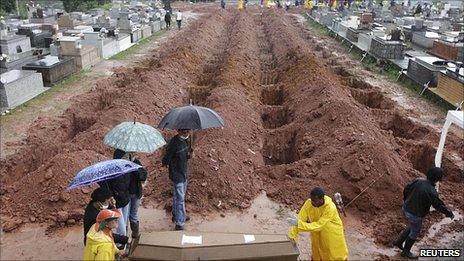Brazil floods: Rain hampers rescue effort
- Published

Emergency crews in Brazil are struggling to reach areas affected by deadly mudslides and floods because of renewed rainfall.
Officials say more than 500 people are known to have died in the floods - the country's worst in decades.
Local media reported rescuers had to reach worst-hit areas on foot because vehicles cannot cross blocked roads.
Mountainous areas north of Rio de Janeiro have been hit by the heaviest downpours in 44 years.
The rain caused rivers of mud to rush down the mountains and tear through towns, levelling houses and throwing cars over buildings.
More than 5,000 people have been left homeless, and officials said at least 511 people had died.
Forecasters have warned that the steady rainfall in the area will continue into next week.
Emergency crews say the weather is causing severe problems.
"The rain did not stop at dawn and is continuing in the morning, which is making the rescue efforts more difficult," fireman Lt Rubens Placido told Reuters news agency from the town of Nova Friburgo.
"The number of deaths is going to rise quite a bit. There are still a lot of people buried."
TV footage showed heavy equipment clearing toppled trees and rubble from streets strewn with broken asphalt.
Morgues were overflowing and had to store bodies in churches and police stations, local media reported.
In the largest cemetery in Teresopolis - where more than 220 died - rows of freshly dug graves were marked with simple wooden crosses. Other graveyards were either full or buried under mud.
The death toll has now surpassed the devastating 1967 mudslides in Caraguatatuba, Sao Paulo state, in which about 430 people died.
Politicians including President Dilma Rousseff have highlighted the practice of people illegally building homes on the side of mountains.
She has vowed to stop such a disaster happening again, and has earmarked 780m reais ($480m; £296m) in emergency funding for the affected areas.
The BBC's Paulo Cabral in Teresopolis says the soil on the hillsides is still extremely wet and unstable, so even a small quantity of water could be enough to cause new disasters.
He says rescue teams are working around the clock searching for survivors, but in most cases they only find bodies under the mud.
There have also been reports of looting, and some of the worst-affected districts have now been abandoned.
The Brazilian military have brought in a field hospital and hundreds of people have taken refuge in the gymnasium in Teresopolis.
But the number of injured was threatening to overwhelm the medical services.
Jorge Mario, mayor of Teresopolis, said three or four neighbourhoods had been "totally destroyed".
- Published13 January 2011
- Published14 January 2011
- Published14 January 2011
- Published14 August 2012
- Published14 August 2012